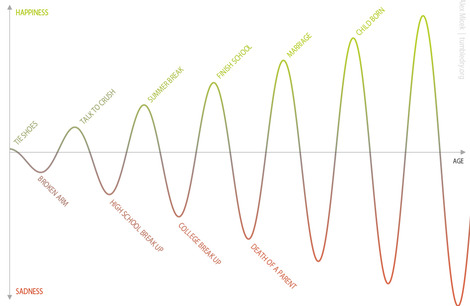Graphing Your Emotional Life
I was listening to This American Life’s most recent show “Family Physics”, about the application of physical laws to relationships. I didn’t hear much of the actual episode, but it caused my mind to wander off on a tangent beginning this way: your emotional range increases as you become older, more mature, more experienced. But, earlier in your life, you can not comprehend the depth of pain and joy you’ll experience in the future. So, at any point in your life, you think that your extremes of happiness or sadness are the limits of your emotional capacity. In fact, you think you are plumbing the depths of despair or scraping the ceiling of joy at a variety of discrete points in your life. What is actually happening is an increase in your emotional distance between happiness and sadness. Instead of representing this with physics, why not use math (specifically, y=0.5(x)*sin(x) )? Indeed, in mathematical terms these emotional points are signified by local minima or maxima of your emotional capacities. This idea can’t be new, but I was so excited about it I made a diagram explaining it.
I know what you’re thinking. “Alex, why are you trivializing life’s wonderful experiences, no matter how small?” The answer is, I’m not trivializing anything at all—I’m just trying to put them in context. After all, these local maxima and minima of your emotional rollercoaster are, as far as you know, your historic highest peak or lowest valley. Each peak on the curve stretches you past your emotional limit and into novel feelings. As a result, each inflection point is closer to orthogonal to the x-axis. With age comes range: greater pain and greater joy.

Comments
Mykala
I find this idea very iiiiiiinteresting. I wonder, though, if while the range of our emotional experiences increases, our capacity to deal with these intensified experiences also increases? For example, dealing with the death of a parent at age 7 is sure to be traumatic and life-changing, but probably not in the same ways it is at 30. Or the elation at giving birth to your first child is experienced differently by a 28 year-old versus a 17 year old. Our capacity to understand and place events into the context of our lives varies tremendously as we mature, and perhaps does so right alongside most milestone experiences accordingly.
So maybe when it comes down to it, what’s hard is hard and what’s great is great no matter what an outside perspective would suggest, because it’s all in how it is experienced by the one who is living it.
Alexander Micek
I am glad you find this interesting! I simply do not think context can be underemphasized… ever. And I think you’re getting at that when you talk about how differently these age groups experience things.
I suppose things are clearer in hindsight, but maybe that’s the only way we can truly put them in perspective. OR, fabricate a narrative of our lives that makes sense.